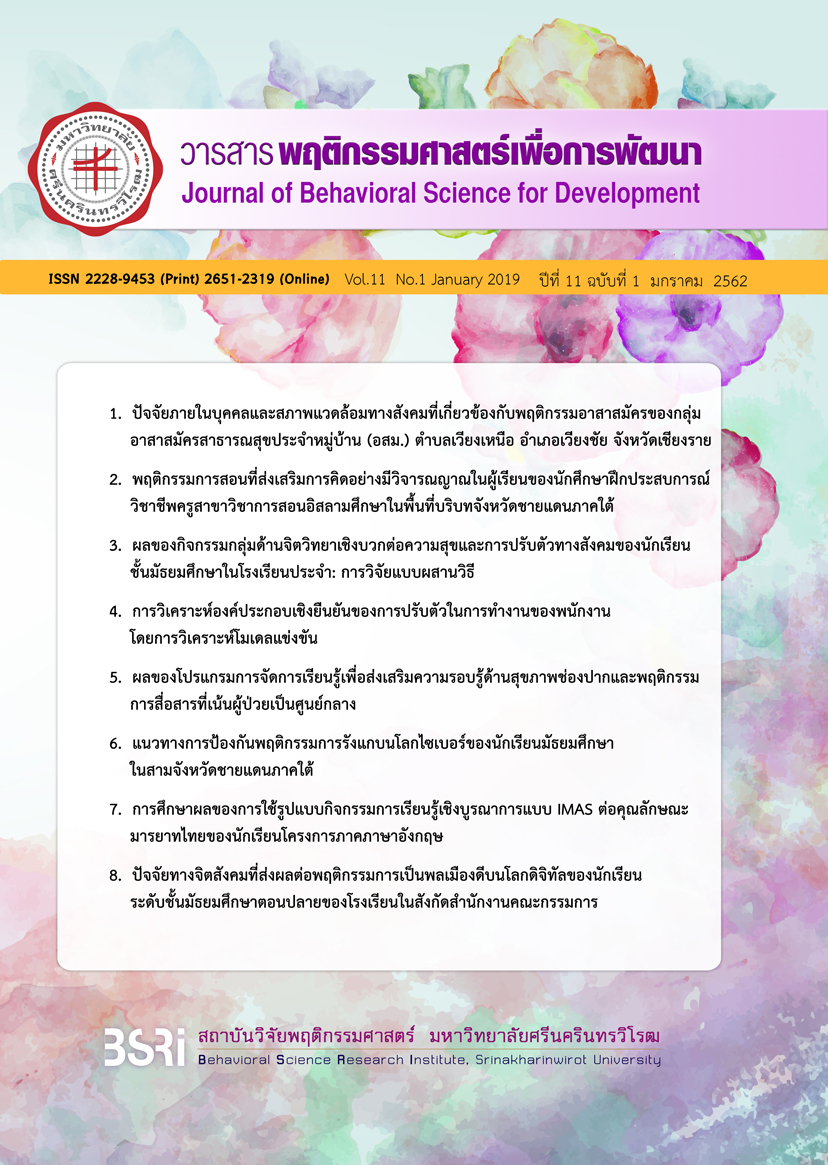แนวทางการป้องกันพฤติกรรมการรังแกบนโลกไซเบอร์ของนักเรียนมัธยมศึกษาในสามจังหวัดชายแดนภาคใต้
Keywords:
guidelines for preventive, cyber bullying behaviors, three southern border provinces, studentsAbstract
Abstract
The purpose of this study was to study of problems, causes and guidelines for preventive cyber bullying behaviors among secondary school students in the three southern border provinces. Data were collected through group interviews secondary school students in the three southern border provinces aged between 13 to 18 years old were 89 colleges and data were collected through group interviews teachers and school director in the three southern border provinces were 27 colleges. Findings indicated that guidelines for development of preventive program for cyber bullying behaviors consisted of perception, critical thinking and awareness were group activities, game, debate and creative brainstorming.
Keywords: guidelines for preventive, cyber bullying behaviors, three southern border provinces, students
References
กัญญาวีร์ บุญเสนันท์ และจินตนา ยูนิพันธุ์. (2555). ผลของพฤติกรรมบำบัดต่อพฤติกรรมก้าวร้าวของเด็กสมาธิสั้น. วารสารการพยาบาลจิตเวชและสุขภาพจิต, 26(1), 114-128.
จามรี ศรีรัตนบัลล์. (2559). การพัฒนากระบวนการส่งเสริมการคิดแก้ปัญหาด้านทักษะสังคมเรื่องการถูกแกล้งสำหรับนักเรียนในระดับประถมศึกษาตอนปลาย. วิทยานิพนธ์ปริญญาปรัชญาดุษฎีบัณฑิต สาขาการพัฒนาทรัพยากรมนุษย์และชุมชน มหาวิทยาลัยเกษตรศาสตร์, กรุงเทพมหานคร.
ชลธิชา ฤทธิ์เนติกุล. (2552). ผลของกิจกรรมกลุ่มที่มีต่อเจตคติด้านค่าพรหมจารีของนักเรียนหญิง. สารนิพนธ์การศึกษามหาบัณฑิต สาขาวิชาจิตวิทยาการแนะแนว มหาวิทยาลัยศรีนครินทรวิโรฒ, กรุงเทพมหานคร.
ณัฐรัชต์ สาเมาะ, พิมพวัลย์ บุญมงคล, Timo T. O., รณภูมิ สามัคคีคารมย์ และ Thomas E. G. (2556). การรับรู้ของเยาวชนต่อการรังแกในพื้นที่ไซเบอร์. วารสารพฤติกรรมศาสตร์เพื่อการพัฒนา, 6(1), 351-346.
ติชิลา แสงแก้ว, อรวรรณ หนูแก้ว และวันดี สุทธรังษี. (2560). ผลของโปรแกรมการจัดการพฤติกรรมก้าวร้าวต่อพฤติกรรมก้าวร้าวในเด็กสมาธิสั้น: การศึกษาเบื้องต้น. วารสารเครือข่ายวิทยาลัยพยาบาลและการสาธารณสุขภาคใต้, 4(ฉบับพิเศษ), 214-229.
ธันยากร ตุดเกื้อ และเกษตรชัย และหีม. (2561). การพัฒนาโมเดลสมการโครงสร้างพฤติกรรมการรังแกบนโลกไซเบอร์ของนักศึกษาวิทยาลัยชุมชนแห่งหนึ่งในภาคใต้ของประเทศไทย. วารสารปาริชาต มหาวิทยาลัยทักษิณ, 31(1), 201-220.
ธันยากร ตุดเกื้อ และมาลี สบายยิ่ง. (2560). รูปแบบ ผลกระทบ และวิธีการจัดการเมื่อถูกรังแกบนโลกไซเบอร์ของนักศึกษาวิทยาลัยแห่งหนึ่งในภาคใต้ของประเทศไทย. วารสารพฤติกรรมศาสตร์เพื่อการพัฒนา, 9(2), 220-236.
นวลฉวี ประเสริฐสุข, คณิต เขียววิชัย, กานดา พู่พุฒ และชลิต ตุ้มทองคำ. (2554). การพัฒนาโปรแกรมความร่วมมือระหว่างครอบครัวและโรงเรียนเพื่อป้องกันพฤติกรรมเสี่ยงของนักเรียนวัยรุ่น: กรณีศึกษาโรงเรียนเทศบาล 2 วัดเสนหา (สมัครพลผดุง). วารสารศิลปากรศึกษาศาสตร์วิจัย, 2(2), 31-52.
ฤทัยชนนี สิทธิชัย และธันยากร ตุดเกื้อ. (2560). พฤติกรรมการรังแกบนโลกไซเบอร์ของเยาวชนในสามจังหวัดชายแดนใต้. วารสารวิทยบริการ มหาวิทยาลัยสงขลานครินทร์, 28(1), 86-99.
ฤทัยชนนี สิทธิชัย. (2560). พฤติกรรมการรังแกบนโลกไซเบอร์ของวัยรุ่น. สงขลา: ชานเมืองการพิมพ์.
วลัยกรณ์ แพร่กิจธรรมชัย. (2555). ผลของการปรับพฤติกรรมเพื่อลดความก้าวร้าวของวัยรุ่นกลุ่มเสี่ยง.วิทยานิพนธ์ปริญญาการศึกษามหาบัณฑิต สาขาจิตวิทยาการแนะแนว มหาวิทยาลัยศรีนครินทรวิโรฒ, กรุงเทพมหานคร.
วัจนินทร์ โรหิตสุข, มะลิรมย์ หัสดินรัตน์, บัณฑิต ศรไพศาล, สุพร อภินันทเวช และชาญวิทย์ พรนภดล. (2557). การวิจัยเชิงคุณภาพเพื่อประเมินประสิทธิผลของโปรแกรมการจัดกิจกรรมในสถานศึกษาแบบบูรณาการเพื่อช่วยเหลือเด็กติดเกม. วารสารสมาคมจิตแพทย์แห่งประเทศไทย, 59(3), 231-244.
วิจิตรา สายอ๋อง. (2555). การพัฒนาโปรแกรมการให้การปรึกษาครอบครัวเพื่อลดพฤติกรรมก้าวร้าวของเด็กนักเรียนอนุบาล ในพื้นที่ภาคใต้ตอนล่างของประเทศไทย. วารสารปัญญาภิวัฒน์, 3(2), 89-110.
วินีกาญจน์ คงสุวรรณ, วีนา คันฉ้อง, วันดี สุทธรังสี และถนอมศรี อินทนนท์. (2557). ผลของโปรแกรมพัฒนาทักษะการจัดการความรุนแรงต่อการป้องกันพฤติกรรมก้าวร้าวของแกนนำเยาวชนระดับมัธยมศึกษา. สงขลานครินทร์ ฉบับสังคมศาสตร์และมนุษยศาสตร์, 20(4), 73-105.
สมโภชน์ เอี่ยมสุภาษิต. (2556). ทฤษฎีและเทคนิคการปรับพฤติกรรม (พิมพ์ครั้งที่ 8). กรุงเทพมหานคร: แห่งจุฬาลงกรณ์มหาวิทยาลัย.
อุษา พึ่งธรรม. (2552). การศึกษาผลของโปรแกรมการป้องกันความรุนแรงในเด็กประถมศึกษา. วารสารโรงพยาบาลศรีธัญญา, 10(1), 19-29.
Bandura, A. (1986). Social Foundations of Thought and Action: A Social Cogntive Theory. Englewood Cliffs. New Jersey: Prentice-Hall Inc.
Del, Rey.R., Casas, J.A., & Ortega, R. (2016). Impact of the ConRed program on different cyberbulling roles. Aggressive Behavior, 42(2): 123-135. doi: 10.1002/ab.21608
Good, C. V. (1973). Dictionary of Education. New York: Mc Graw-Hill Book Company.
Kalaitzaki, A. E. and Birtchnell, J. (2014). “The impact of early parenting bonding on young adults' Internet addiction, through the mediation effects of negative relating to others and sadness”, Addictive Behaviors. (39), 733-736.
Klausmeier, H.J. (1985). Educational psychology 5th ed. New York: Harper & Row.
Laeheem, K. (2013). Guidelines for solving bullying behaviors among islamic private school students in songkhla province, Asian Social Science. 9(11), 83-89.
Salmivalli C., & Poskiparta E. (2012). Making bullying prevention a priority in Finnish schools: the KiVa antibullying program. New Directions for Youth Development, (133), 41-53.
Sittichai, R., and Smith, P. K. (2013). “Bullying and cyberbullying in Thailand: A review”, International Journal of Cyber Society and Education. 6(1), 31-44.
Smith, P. K., Mahdavi, J., Carvalho, M., Fisher, S., Russell, S., and Tippett, N. (2008). “Cyberbullying: Its nature and impact in secondary school pupils”, Journal of Child Psychology & Psychiatry. 49(4), 376-385.
Translated Thai References (ส่วนที่แปลรายการอ้างอิงภาษาไทย)
Boonsanu, K. (2012). The effect of behavior therapy on aggressive behaviors of children with attention-deficit/hyperactivity disorder. The Journal of Psychiatric Nursing and Mental Health. 26(1), 114-128.
Iamsuphasit, S. (2013). Theories and techniques in behavior modification, 8th ed. Bangkok: Chulalongkorn University.
Kongsuwan, V., Chanchong, W., Suttharangsee, W., & Intanon, T. (2016). The effects of violence management skills training program for core-team high school youths in preventing aggressive behaviors. Songklanakarin Journal of Social Sciences and Humanities, 20(4), 73-105.
Pangthum, U. (2009). The study od violence prevention training program for elementary school students. Journal of Srithanya Hospital, 10(1), 19-29.
Parekitthammachai, V. (2012). The effects of behavior modification to reduce aggressive behavior of adolescents at risk. Master of Education Degree (Guidance and Counseling Phychology) Bangkok: Srinakharinwirot University.
Prasertsuk, N., Kheovichai, K., Pooput, K., & Toomthongkum, C. (2011). Developing a collaborative family – school program to prevent adolescent students’ risk behaviors: a case study in tesaban 2 school wad saneiha (smukpolphadung). Silpakorn Educational Research Journal, 2(2), 31-52.
Ritnetikul, C. (2009). The effect of group activities on attitude toward value of virginity of female students (Unpublished master’s thesis). Srinakharinwirot University, Bangkok.
Rohitsuk, W., Hasdinrat, M., Sornpaisarn, B., Apinuntawed, S., & Pornnoppadol, C. (2014). A qualitative study to evaluate effectiveness of the Multi-systematic school-based intervention program for helping children with game addiction. Journal of the Psychiatric Association of Thailand, 59(3), 231-244.
Samoh, N., Boonmongkon, P., Ojanen, Timo.T., Samakkeekarom, R., Guadamuz & Thomas E. (2014). Youth perceptions on cyberbullying, Journal of Behavioral Science for Development. 6(1), 351-346.
Sangkaew, T., Nukaew, O., & Suttharangsee, W. (2017). The effects of an aggressive behavior management program on behaviors of children suffering from attention defcit-hyperactivity disorder (adhd): a preliminary study. The Southern College Network Journal of Nursing and Public Health, 4(Special Issue), 214-229.
Seyong, V. (2012). Family counseling program development for decreasing aggressive behavior of kindergarten children in lower southern Thailand. Panyapiwat Journal, 3(2), 89-110.
Sittichai, R. & Tudkuea, T. (2017). Cyberbullying behavior among youth in the three southern border provinces, Thailand, Academic Services Journal Prience of Songkla University. 28(1), 86-99.
Sittichai, R. (2013). Cyberbullying behavior among adolescents. Songkhla: Chanmeụuxng karphim.
Sriratanaban, J. (2016). Development of a process to enhance problem-solving skills for bullying in the upper primary students. Doctor of Philosophy (Human and Community Resorce Development) Bangkok: Kasetsart University.
Tudkuea, T. & Laeheem, K. (2018). Development of structural equation modeling of cyber bullying behavior among students in a community college in the southern part of Thailand, Parichart Journal Thaksin University. 31(1), 201-220.
Tudkuea, T. & Sabaiying, M. (2017). Patterns, effects and coping with cyber bullying among students of a college in the southern part of Thailand, Journal of Behavioral Science for Development. 9(2), 220-236.



